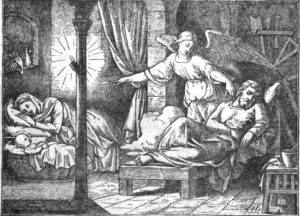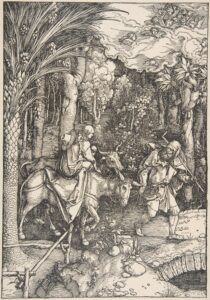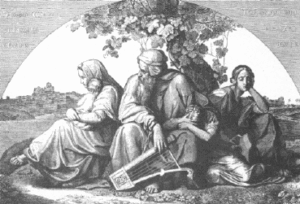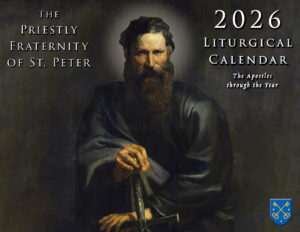The Mass of the Flight into Egypt
by Fr. William Rock, FSSP

In editions preceding the 1962 edition of the Roman Missal, in the section for Masses for particular places (Missæ Pro Aliquibus Locis), listed for February 17th, is the Mass of the Flight of Our Lord Jesus Christ into Egypt (Fugæ D.N. Jesu Christi in Ægyptum). Although the Holy Family’s flight into Egypt is recounted in the Gospel of Matthew, information must be supplied from the Gospel of Luke to have a clearer picture of the events of the Divine Childhood. For Matthew’s Gospel, while it does narrate the visit of the Magi and the Flight into Egypt, does not mention Our Lord’s Presentation in the Temple. Taking this into account, the Flight into Egypt must have occurred after the Presentation in the Temple in Jerusalem, that is, after February 2nd. According to some interpreters, such as Cornelius a Lapide, it was the hearing of news of the excitement caused during Our Lord’s Presentation which roused King Herod, recalling the visit of the Magi and their failure to return to him, to action. As such, observing the Flight into Egypt on February 17th, fifteen days after the Presentation, agrees with this timeline.
The Introit, or entrance chant, of this Mass is taken from the beginning of the Gospel account of the Flight (Mat 2:13) and the Psalm Verse is Ps 54:8:1
An angel of the Lord appeared in sleep to Joseph, saying: Arise, and take the child and his mother, and fly into Egypt. (T.P. Alleluia, alleluia.) Ps. Lo, I have gone far off flying away; and I abode in the wilderness. Glory Be… An angel….
The Psalms are often interpreted as speaking for the New David Who is to Come. As such, the words of Psalm 54 used in the Introit can be seen as being “spoken” by Our Lord as He flees into Egypt.
The Collect (opening prayer) is as follows:
O God, the Protector of those who hope/trust in Thee, Who willed that Your Only-begotten Son, Our Redeemer, be rescued from the sword of Herod by the flight into Egypt: grant to us, your servants, through the intercession of the Most Blessed Ever-Virgin Mary, His Mother, that, freed from all dangers of mind and body, we may merit to arrive at our heavenly fatherland. Through the same Our Lord…
Protéctor in te sperántium, Deus, qui Unigénitum tuum, Redemptórem nostrum, ex Heródis gladio fuga in Ægýptum erípere voluísti: concede nobis fámulis tuis, beatíssima semper Vírgine, ejus Matre María, intercedénte; ut, ab omnibus mentis et córporis perículis liberáti, ad coeléstem pátriam perveníre mereámur. Per eúndem Dóminum nostrum…

The first part of the oration makes it clear that the Flight into Egypt was part of the Divine Plan of the Father. It was not something which happened by chance or by accident. God protects those who hope and trust in Him, even, if at the time, things seem dark and confusing. The second part of the oration asks for God’s aid, through the intercession of the Blessed Virgin Mary, so that the faithful may arrive at their heavenly homeland, mirroring the Flight into Egypt. Just as God watched over the Holy Family during their flight into exile, may He watch over the faithful as they make their way from this land of exile to their true home.
The Epistle is taken from the Prophet Isaiah (Is 19:20-22):
In those days: they shall cry to the Lord because of the oppressor, and He shall send them a Saviour and a defender to deliver them. And the Lord shall be known by Egypt, and the Egyptians shall know the Lord in that day, and shall worship Him with sacrifices and offerings: and they shall make vows to the Lord, and perform them. And the Lord shall strike Egypt with a scourge, and shall heal it, and they shall return to the Lord, and He shall be pacified towards them, and heal them, the Lord, Our God.
This Epistle was no doubt chosen in reference to the tradition that during His time in Egypt, that country was shaken by Our Lord’s presence there. Answering why the Holy Family was directed to flee into Egypt, a Lapide relates the following in his commentary:
Because Egypt was full of idols and superstitions. They worshipped dogs, crocodiles, cats, calves, rams, goats, and what not. Christ entered into Egypt that He might cleanse it from this filthiness, and consecrate it to the true God. Listen to S. Leo (Serm. 2 de Epiph.): “Then also the Saviour was brought to Egypt, in order that a nation given up to ancient errors might now be signed for salvation nigh to come, for hidden grace, and that she which had not yet cast out superstition from her mind might receive truth as her guest.” Whence also Isaiah prophesies mystically of the same thing (xix. 1), saying: “Behold the Lord shall ascend upon a light cloud [the Blessed Virgin], and shall enter into Egypt, and all the idols of Egypt shall be moved at his presence.” And so S. Jerome and others relate that the idols of Egypt did, in truth, fall down when Christ came into it.
He also adds:
It cannot be doubtful that when the Egyptians saw the sanctity of the Blessed Virgin and Joseph, and had had frequent opportunities of converse and intercourse with them, they came to know, worship, and love the true God.
Who arose, and took the child and his mother by night, (mark his prompt obedience) and retired into Egypt—that Christ might sanctify and bless it by His coming. Hence faith and sanctity so flourished in Egypt that it produced the Pauls, the Antonys, the Macarii, and those crowds of monks and anchorites who emulated the life of angels upon earth, as is seen in Eusebius, S. Jerome, Palladius, S. Athanasius, and the lives of the Fathers. Whence S. Chrysostom, in loc., says, that Christ converted Egypt into a paradise. “Heaven does not shine so brightly with the various choirs of the stars as Egypt is illuminated by its innumerable habitations of monks and virgins.” And Trismegistus, quoted by S. Austin (lib. 8, de Civ. Dei, c. 14), says, “Egypt is an image of Heaven, and the temple of the whole world.”
The Gradual is again taken from the Psalms (Ps: 90:11-12), describing how the Angels watched over the Christ Child during His journey and stay in Egypt:
For He hath given His angels charge over thee; to keep thee in all thy ways. In their hands they shall bear thee up: lest thou dash thy foot against a stone.
The Alleluia again quotes from the Gospel of Matthew the Angel’s message to Joseph as in the Introit (2:13). If February 17th occurs after Septuagesima, a Tract, quoting the same text as the Alleluia, replaces it. The Missal also provides a Paschal Alleluia to be used in Masses said during the Easter season, which again quotes Matthew 2:13.
The Gospel recounts the message of the Angel to St. Joseph in his dream and the Holy Family’s fleeing into Egypt (Mat 2:13-15).
The Offertory is taken from the second half of the Epistle just read (Is 19:21).
The Secret (prayer over the offerings) reads as follows:
We immolate/sacrifice victims/hosts of praise to You, O Lord, humbly praying/asking that, You, Who willed, as an exile, to be carried in Egypt with your Mother, the Most Blessed Virgin Mary, by the intercession of same Blessed Virgin, would kindly lead us exiles to our heavenly fatherland: You Who lives and reigns…
Laudis tibi, Dómine, hóstias immolámus, supplíciter deprecántes ut, qui cum beatíssima Matre Vírgine María in Ægýptum exsul deférri voluísti; éxsules nos, eádem beáta Vírgine intercedénte, ad coeléstem pátriam benígnus perdúcas: Qui vivis et regnas…
This prayer, addressing Our Lord as an exile, asked of Him that same which was asked of the Father in the Collect. The beginning of this oration uses a formula commonly used among the Secrets.
The Missal indicates that the Preface of the Nativity, or the Christmas Preface, is to be used when this Mass is prayed. The use of this preface is fitting as the Mass commemorates an event of Our Lord’s childhood, one which occurred not that long after His birth.
The Communion is taken from the end of the Gospel (Mat 2:14-15):
And he was there until the death of Herod: that it might be fulfilled which the Lord spoke by the prophet, saying: Out of Egypt have I called my son.
a Lapide, again answering why the Holy Family was directed to Egypt, wrote:
Because Abraham, Isaac, and Jacob, and all the children of Israel, from whom Christ was sprung, dwelt in Egypt for four hundred years, and were called forth from thence by God, by the hand of Moses. And this was a type of the calling back of Christ out of Egypt, as S. Matthew adds, That it might be fulfilled which was spoken of The Lord by The prophet (Hosea xi.) saying, Out of Egypt have I called my son. Especially because the Hebrews were delivered out of Egypt by the blood of the Paschal Lamb, which was a type of Christ. “That not without that region the sacrament of the one only Victim might be prepared, in which first the safe-giving sign of the slaying of the Lamb, and the Passover of the Lord, had been prefigured,” says S. Leo. (Serm. 3 de Epiph.)
The Postcommunion is as follows:
Grant to our minds, almighty God: that, through the temporal flight of Your Son, which these venerable mysteries testify, we may have confidence that You have given us eternal life. Through the same Lord…
Largíre sénsibus nostris, omnípotens Deus: ut per temporálem Fílii tui fugam, quam mystéria veneránda testántur vitam te nobis dedísse perpétuam confidámus. Per eúndem Dóminum…
This Postcommunion follows the Postcommunion for the Wednesday of Holy Week which reads:
Grant to our minds, almighty God: that, through the temporal death of Your Son, which these venerable mysteries testify, we may have confidence that You have given us eternal life. Through the same Lord…
Largíre sénsibus nostris, omnípotens Deus: ut, per temporálem Fílii tui mortem, quam mystéria veneránda testántur, vitam te nobis dedísse perpétuam confidámus. Per eúndem Dóminum…
Both are fitting Postcommunions, as the Holy Eucharist just received is “a pledge of future glory” and of eternal life.2

This Mass, with its themes of exile and asking God to guide us to our true fatherland, is well fitted for the time of Septuagesima, in which or near which February 17th will always fall. For liturgical commentators,3 the season of Septuagesima, which comes from the Latin for 70, brings to mind the Babylon Captivity of the Jews which lasted 70 years and invites the faithful to reflect upon their own exile from both the earthly and heavenly paradises due to sin. May we follow, especially during the season of Septuagesima, the lesson given to us by the exile Christ, for “Christ fled into Egypt that He might teach us to despise exile, and that we, as pilgrims and exiles on the earth, might pant after and strive for heaven as our true country” (a Lapide).
William Rock, FSSP was ordained in the fall of 2019 and is currently assigned to Regina Caeli Parish in Houston, TX.
- The Propers of the Mass were taken from this edition of the Roman Missal.
- Magnificat Antiphon for Second Vespers of the Feast of Corpus Christi.
- Guéranger, Prosper. The Liturgical Year, 4 (Septuagesima). Trans. Shepherd, Laurence. (Fitzwilliam: Loreto Publications, 2000), pp. 6-11.
February 17, 2023








